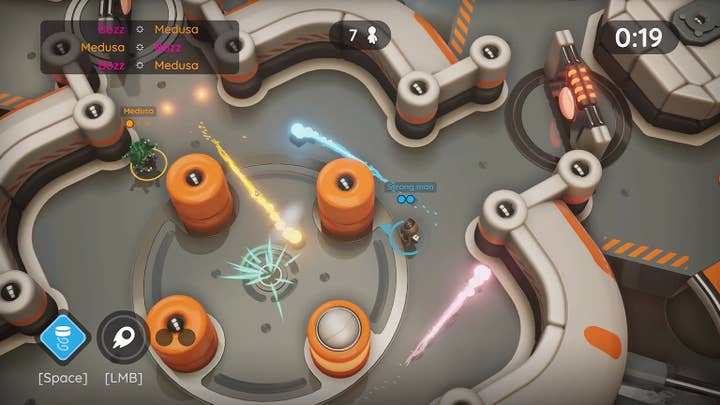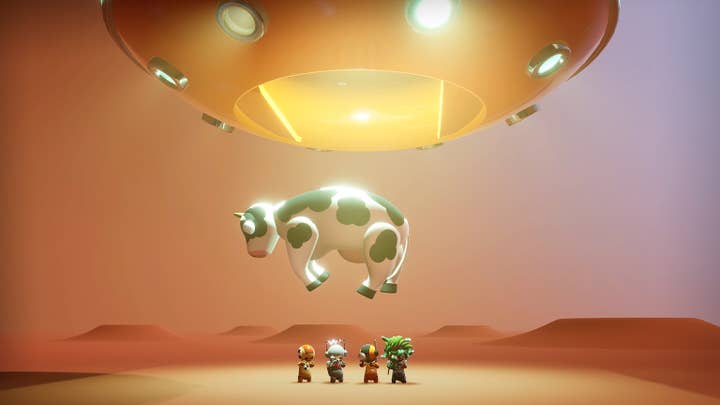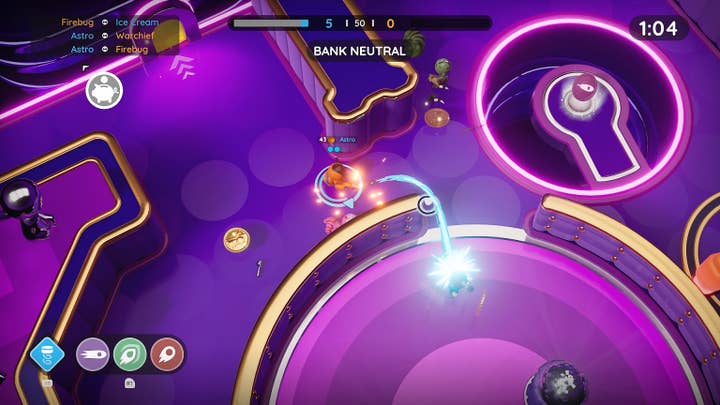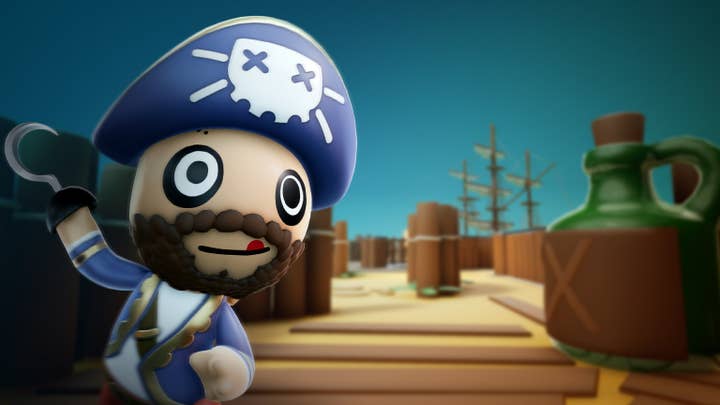Splash Damage exploring friendlier territory with Outcasters
Veteran developer of competitive online shooters aims for approachability with its new game for Stadia
In nearly two decades of development, Splash Damage has been best known for its work on competitive online shooters like Dirty Bomb, Brink, and the Quake and Wolfenstein franchises' Enemy Territory games. In many ways it has built the business by catering to a traditional gamer audience.
Speaking with GamesIndustry.biz recently, Splash Damage co-founder and CEO Richard Jolly says that's partly a product of the company's founders, who met playing Quake online and as a result built competitive multiplayer into "the core DNA" of the studio. And two decades ago, competitive multiplayer was anything but approachable.
"Multiplayer back then was so niche," Jolly says. "And the friction to getting into multiplayer was like, making sure you had a decent enough internet connection and then convincing your mom not to interrupt you when you were in a clan match. It's funny to think how multiplayer has grown into something much, much bigger than it was or we ever could conceive of back then."
Even though competitive multiplayer gaming has become a more mainstream pursuit, Jolly believes there's a bigger audience for it than Splash Damage has tapped into so far. The studio hopes to change that, as today Splash Damage announced its next game, Outcasters.
Currently only announced for Stadia, Outcasters is a third-person competitive online shooter with a less gritty aesthetic than the studio is used to and a new bullet-curving gameplay hook that Stadia Games & Entertainment senior producer Nico Zettler says makes it an ideal match for the platform.

"It's basically a model of what makes Stadia exciting," Zettler says. "It's very approachable if you think about the visual design and gameplay, which of course is often what you're looking for as a publisher and a platform. There is this huge customization part which everybody is really interested in that helps you to express yourself. And another reason is it's highly watchable. Of course, we're tied into YouTube, so it's a perfect match made in heaven for us."
Outcasters' aesthetic in particular is an important part of Splash Damage's push to reach new audiences.
"When I first started, it was incredibly male dominated and I think that was very much coloring the kind of games we were making"
Richard Jolly
"The industry's moved on a lot," Jolly says. "When I first started, it was incredibly male dominated and I think that was very much coloring the kind of games we were making. For us as a studio that's growing up, that has children and responsibilities now, we wanted to hit a broader audience but still have that core multiplayer gameplay experience that would come through but be presented in a fun, light-hearted way. It also tests the range of what we can do as a studio that we aren't just looking at traditional FPSes all the time. We're broadening and experimenting with things."
While Outcasters may look like a stylistic departure for Splash Damage, Jolly says under the hood it's very much in keeping with the studio's history of work.
"If you look at what epitomizes the competitive shooter, even back from the days of Quake, it's really learning the levels," Jolly explains. "I would spend hours just running around an empty level, just understanding the nuances and the ways players would come from. Then there was the added layer of power-ups and knowing how you would control them, how you would stop your enemies from getting them, or even using them as traps. And then the final element is how you use your weapons and projectiles to start repositioning the enemy to such a point where you can actually secure the final kill. All those hardcore notions of competitive gaming, we've taken that and distilled it down into Outcasters.
"Coming up on 20 years now, we've aged as a studio. We've grown up. We've all got families now, responsibilities. And we wanted to take a lot of those core feelings of the competitive nature of shooters and the team play that comes around it, and distill that into a bite-sized, accessible experience so you could really sit down and play it in two-minute chunks if you want to, and then have it grow and evolve beyond there."

Outcasters project lead Lily Zhu says the idea is that the game's "elegant and simple aesthetic" makes it easy to pick up and play, but the mechanical complexity make it difficult to master.
The curve shot is part of that, as players will be using a mouse or one of a controller's analog sticks to direct how the shot should bend around the arena.
We ask if introducing an unfamiliar mechanic like shot curving works against the approachability focus of the game. Jolly dismisses the idea, saying it's just another building block of player skill and new players can get by firing nothing but straight shots if needed.
"We have really short sessions as well, which adds on top of accessibility... you can go again and again and again and test out different things until a player knows exactly how they want to play"
Lily Zhu
"You can still compete in that way, but where it comes into its own is when you start to master the homed shot and curving around corners," Jolly says. "You have to move a lot because if you're in cover, you're not really in cover because the shot can come around the corner and hit you."
Zhu adds that Splash Damage is offering a variety of settings so players can tweak the sensitivity of the curving mechanic and find a setting that fits with the way they want to play the game.
"We have really short sessions as well, which adds on top of accessibility," Zhu says. "It's five-minute matches for a Gold Rush map, so you can go again and again and again and test out different things until a player knows exactly how they want to play."
In addition to the team-based objective Gold Rush mode, Outcasters will feature a more traditional (and self-explanatory) Last Caster Standing mode where a tightening circle forces players into the middle of the playfield towards the end of each match.
As for whether the core competitive multiplayer concepts that informed Splash Damage's previous work will still resonate with a broader audience, Jolly is confident they will.

"If you break things down into their core mechanics, there is so much that repeats in the gaming world," Jolly says. "If you distill what the Battle Royale mechanic is, it's essentially session-based progression. This is something we did back in Wolfenstein: Enemy Territory. And it later evolved after that into the MOBA series. But if you really drill things down, a lot of mechanics are reinvented for modern audiences.
"I think that's a challenge we all have as game designers, to take what has been great... Because there's been really great stuff that's been forgotten, but it hasn't quite been brought up to the modern way that players would accept them. That's part of the challenge, I think, in looking back on your learnings and seeing which ones still fit and which ones can be applied in different ways."
The game will also embrace a live service model, and while it was too early for details about exactly how that will look, Jolly says it's quite similar to any game the studio works on with a multiplayer push.
"You play your game so much you think you know it intimately," Jolly says. "But the second it's in the hands of players, you have to relinquish control of that game and it has to become theirs. That's been a big mantra for us as a studio, because the reality is they play it more than you do, they know it more than you do, and they all play in ways you never thought were possible. That's always exciting."
There's no release date yet for Outcasters, which is billed as an "Only on Stadia" title, which only means the developer has not announced plans to bring it to other platforms.

